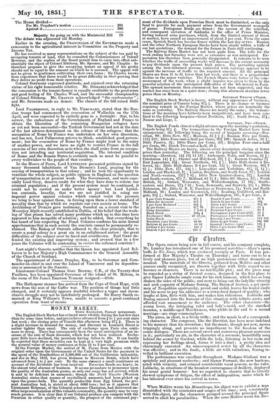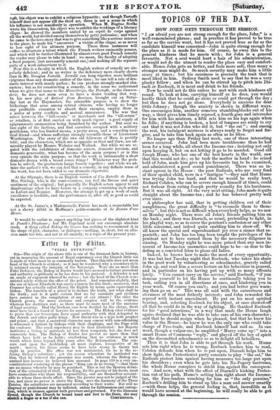When Moliere wrote his Misanthrope, his object was to exhibit
a man dissatisfied with the courtesies and usages of his time ; and, consistently with this object, all the characters grouped around the principal figure served to elicit his peculiarities. When the same Moliere wrote his Tar-
tufe, his object was to unlit a religions h 'to ; and though Tartuffe
himself does not appear till the third act, there is not a scene in which his influence is not manifestly in operation. When M. Eugene Scribe wrote his Camaraderie, his object was to exhibit the workings of a literary clique : he showed the members united by an esprit de corps against all the world, but divided among themselves by petty jealousies ; and when he came to the love-story that was to give something like a serious interest to the piece, he made his " amourenx" a victim of the clique, so as never to lose sight of his ultimate purpose. These three instances will suffice to illustrate a talent which the French writers eminently possess, and which will be further illustrated by almost every good French eomedy the reader may please to take in hand : we mean, the faculty of adopting a fixed purpose, (not necessarily amoral one,) and making all the separate parts of a work subservient to it. Now this is a faculty in which the English writers of comedy are sin- gularly deficient ; and in no writer is the deficiency more clearly shown than in Mr. Douglas Jerrold. Jerrold can heap together more brilliant epigrams than any dramatic author of the time ; he can tell a tale of dra- matic interest with manly pathos ; he can produce strongly-marked cha- racters ; but as for constructing a comedy, in the sense we understand when we give that name to the Misanthrope, the Tartuffe, or the Camara- derie, he does not seem even to have a desire tending that way. In his new play of Retired from Business, brought out on Satur- day last at the Haymarket, the ostensible purpose is to show the bickerings that arise among retired citizens, who having no longer any profitable avocation to absorb their energies, employ them in a series of petty conflicts and mutual annoyances. The war that arises between the " bill-ocrats " or merchants and the " till-oemts" or retailers, is at first carried on with much vigour : a good supply of epigrammatic ammunition being furnished by the author. But soon we lose sight of the factions, and find ourselves occupied with a military gentleman, who has limited means, a pretty niece, and a consoling nau- tical friend—and whose sufferings strongly resemble those of Lieutenant Worthington. The story of the two old followers of Mars is prettily told ; and the characters, which are as opposite as frost and thaw, are ad- mirably played by Messrs. Webster and Wallack. But while we are re- galed with the exhibitions of domestic sorrow, domestic heroism, and domestic generosity, what has become of the main purpose ? or is this very episode the main purpose, so that the work is intrinsically a short domestic drama with a broad comic fringe ? Whichever way the prob- lem be solved, the production hangs loosely together ; and while we ad- mire the author's wit, we can feel that a comedy, in any definite sense of the word, has not been added to our dramatic repertoire.



























 Previous page
Previous page